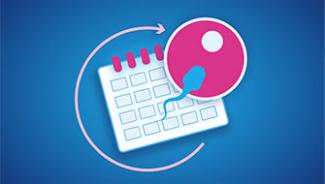How to set boundaries in relationships with friends when pregnant or trying to conceive

Setting and keeping healthy boundaries is an essential, popularly discussed part of mental and emotional health. Boundary setting is especially important among friends when you’re pregnant or trying to conceive (TTC). Find out what relationship boundaries are and why they’re important — and get some real-life examples of how to set boundaries during these life-changing times.
What is a relationship boundary?
A boundary is a limit you set to protect yourself. According to the American Psychological Association, a boundary protects your integrity or helps you set realistic limits on participation in a relationship or activity.1
Why are boundaries in relationships important?
Boundaries can help create and sustain authentic, fulfilling, long-lasting relationships. Additionally, setting boundaries can enhance your mental health by helping you let go of whatever is causing you stress and anxiety.2
According to a study in Dialogues in Clinical Neuroscience, a diagnosis of infertility can cause a great deal of stress.3 And according to The American College of Obstetricians and Gynecologists, anxiety disorders are the most common mental health condition, with nearly one in five adults experiencing an anxiety disorder, including those who are pregnant or postpartum.4 When you or one of your friends is pregnant or TTC, those relationship boundaries are especially key.
How to set boundaries with friends
Examples of boundaries can include time and energy boundaries, personal space boundaries, conversation boundaries and social media boundaries. When you’re pregnant or TTC, you may feel a need to set different boundaries, or friends may ask to set new boundaries with you. Many types of boundaries can exist depending on your personal needs.
Here we dig a little deeper into each of these boundaries and provide some examples of what to say to your friends when you need to establish one.
Time and energy boundaries
- When TTC: Whether you’re just a few months in or you’re navigating infertility, TTC can be mentally and emotionally taxing. It’s common to feel as if you have zero energy for Saturday brunch. So, what might you say to a friend who may not understand your absence? “I’m going through a difficult time right now. I’ll let you know when I’m in a better place, and I hope we can catch up soon.”
- When pregnant: In early pregnancy, it’s common to feel tired (OK, exhausted). You also may experience nausea — and not just in the morning, but all day.5 It’s normal to not want to stay out past midnight on a Friday night (or even go out at all)! Here’s an example of how to set a time and energy boundary when pregnant: “I haven’t been feeling well. As soon as I have more energy to do things, I’d love to meet up.”
Personal space boundaries
- When TTC: Friends may instinctively want to hug you during this time in your life. And then they may take it a step further, pulling back, their hands on your shoulders, asking you with their eyes locked on yours, “How are you doing ... really?” Although your friend may mean well, some days you simply aren’t going to be in the mood for this level of contact (even if you were a hugger before). So how do you deal with this? “I appreciate your care and concern, but I’m just not in the mood to hug today.”
- When pregnant: A funny (er, annoying) phenomenon sometimes happens once you announce your pregnancy — friends (and family members and strangers) may want to touch your belly. Everyone’s level of comfort differs when it comes to personal space (and touch), so you should consider what feels comfortable for you. Setting a personal space boundary can be as simple as “Stop.” If you prefer a softer approach, you may say: “The baby’s not kicking right now! Also, I prefer that people ask before touching my belly.”
Conversation boundaries
- When TTC: Your friends likely feel helpless in your TTC journey and may want to do anything they can to help you in this situation. This may manifest as sharing success stories or advice, both of which may add to, instead of lessen, your emotional grief. If this happens, you may say: “I know you’re trying to help, but I’ve heard and read so much advice these days, and lately it’s just making me feel worse. Can we talk about something not-pregnancy-related instead?”
- When pregnant: People tend to forget the wise adage to think before you speak when talking to folks who are pregnant. Your pregnancy will likely bring up labor stories, some of which you may not want to hear. Friends may also want to give you advice, honestly thinking they’re being helpful. They may not realize it if you’re feeling overloaded with advice, or perhaps getting a little tired of talking about pregnancy all the time. You can always redirect or try a response like this: “Thank you for the advice, but I’ve been feeling a bit overwhelmed with advice these days,” or, “I’ve been having so many conversations about the baby lately — I’d love to hear more about what’s going on with you!”
Social media boundaries
- When TTC: At times it may feel like your timeline is flooded with friends’ pregnancy and baby- related posts. Just the sight of these posts may make you feel jealous, and then guilty for feeling jealous (and maybe also sad and mad). All these emotions are normal. What should you say? Nothing. You can temporarily hide your friends on social media without them knowing. Don’t feel guilty about taking a break from liking, hearting or commenting on posts, too.
- When pregnant: Whether you’re on social media or not, news related to your pregnancy has its way of making the rounds. Think about what you want shared publicly and when, and don’t be shy about making your wishes known. This may sound like: “We’re not ready to share this news publicly. Please don’t post anything online until (or unless) we say it’s OK.”
What boundaries should I set if my friend or loved one is TTC or pregnant?
While supporting a friend or loved one who is TTC or pregnant, there may come a time when you need to set boundaries related to time and energy, conversation and social media. Pregnancy and trying to get pregnant can be an emotionally fulfilling but also challenging time, and your friend may rely on you for encouragement and support. Sometimes this can feel overwhelming. If this happens, consider setting some boundaries. Here’s what that might look like.
Time and energy boundaries
- When a friend or loved one is TTC: There often are a lot of ups and downs when TTC. Your presence may be frequently requested during down periods, and you may feel a sense of obligation to always comply. It’s OK to sometimes decline. Try: “I know you’re going through a tough time right now, and I wish I could meet you today. Does a date sometime next week work for you?”
- When a friend or loved one is pregnant: Your friend who is pregnant likely has a long to-do list. Maybe you’re in a busy season at work, you have a lot going on in your own life or you miss non- baby-related activities. You might try creating boundaries through compromise, which may include connecting with several other friends to share in the tasks of throwing a baby shower.
Conversation boundaries
- When a friend or loved one is TTC: Sometimes it may feel as if your life, including your struggles and difficulties, has all but disappeared when engaging with a friend who is trying to conceive. It’s not because they have been forgotten. Rather it’s because TTC can make a person so singularly focused, it can be easy to forget about the world at large and those within it. If this happens, try: “I can’t imagine what you must be going through. Although very different, I’m also going through something really difficult in my life too and I could use a friend’s ear. Do you mind if I share?”
- When a friend or loved one is pregnant: Pregnancy can feel life-altering in many ways, and so it’s understandable that your friend or loved one talks about it often. But for myriad reasons, you may sometimes want — or need — a break from these conversations. If so, try to simply shift the talk with a quick statement about the pregnancy followed by the topic you want or need to discuss: “I’m so excited for you,” or, “I’m so sorry you haven’t been feeling well,” followed by, “I’ve been really wanting to tell you about XYZ.”
Social media boundaries
- When a friend or a loved one is TTC: Similarly, if your friend is sharing their TTC journey on social media, you have no obligation to engage or respond to every post, especially if you’re not sure what to say. Curate your social media experience to your needs in the moment.
- When a friend or a loved one is pregnant: You may quietly tire of pregnancy-related social media announcements and posts, and yet always feel an obligation to respond with giddy responses and emojis. Let go of the guilt. Honestly, chances are no one will even notice if you scroll past without responding. You can even quietly hide people on social media for a while. You are allowed to make your social media experience what you want it to be. Plus, authentic in-person conversations and congratulations will be more fondly remembered.
How do I establish and maintain boundaries?
To build good boundaries in friendships, you first must establish them, then communicate them, consider consequences and, finally, be consistent.
- Establish your boundaries. The boundaries you create for yourself are going to be different from the boundaries your friends create. And the boundaries you create during one pregnancy may be different than the boundaries you create during your next pregnancy. We are all different from each other, and we all change and grow. The sooner you think about and establish your boundaries, the better.
- Communicate your boundaries. It’s important to communicate your boundaries clearly. Depending on your personality, this may be difficult. Remember this mantra: You matter. Trust that your friends love you, respect you and want to know what your boundaries are — your mental and emotional well-being matter to them, too.
- Consider potential consequences. As hard as it may be, there may come a time when you have to consider the consequences of setting boundaries. You don’t have to voice these upfront, but you may need to voice them if the boundaries you establish are continually ignored. What’s an example of a consequence? It may mean taking a break from seeing the friend who continues to ignore your boundary for a while.
- Be consistent. If you aren’t, your friends may start to wonder whether you’ve changed your mind or may assume their former (or new) behavior is OK.
Setting boundaries may initially feel like building walls, especially when you think about friends with whom you may have shared nearly every thought and feeling in the past. TTC and pregnancy can be difficult, incredible, emotional times. Setting boundaries is a way to ensure your friendships have solid footing going forward. Boundaries create a guidebook for you and your friends to follow to make this emotionally charged time as personally helpful and rewarding as possible. In this way, boundaries allow you and your friends to become closer, better understanding what you each need as you navigate your personal journeys together.
Related Articles
- American Psychological Association. APA Dictionary of Psychology. Boundary. Accessed December 12, 2022. https://dictionary.apa.org/boundary
- WebMD. Setting boundaries. Updated October 25, 2021. Accessed March 20, 2023. https://www.webmd.com/mental-health/setting-boundaries
- Rooney KL, Domar AD. The relationship between stress and infertility. Dialogues Clin Neurosci. 2018;20(1):41-47. doi:10.31887/DCNS.2018.20.1/klrooney. Updated March 2018. Accessed March 20, 2023. https://www.ncbi.nlm.nih.gov/pmc/articles/PMC6016043/
- The American College of Obstetricians and Gynecologists. Anxiety and pregnancy. Updated November 2021. Accessed March 20, 2023. https://www.acog.org/womens-health/faqs/anxiety-and-pregnancy
- The American College of Obstetricians and Gynecologists. Changes during pregnancy. Updated October 2020. Accessed December 12, 2022. https://www.acog.org/womens-health/infographics/changes-during-pregnancy

When is the best time to get pregnant?
There are only a few days each cycle, around ovulation, when a woman is fertile. Knowing these days can maximise your chance of conceiving.

Get pregnant naturally
Ovulation tests are accurate and simple to use.

Find the right pregnancy test for you
Our range of pregnancy tests are especially designed to meet your individual needs, whether you need fast, early, or digital results or more information about your pregnancy.




